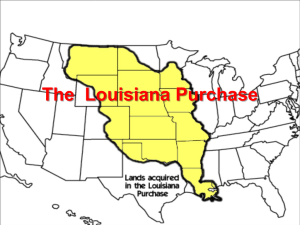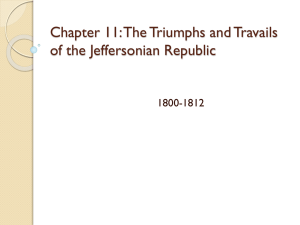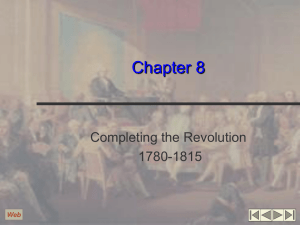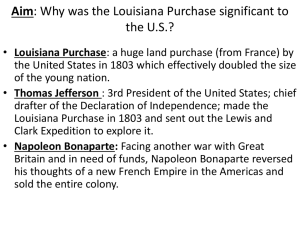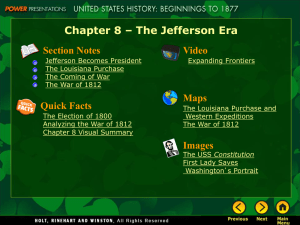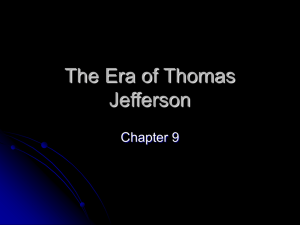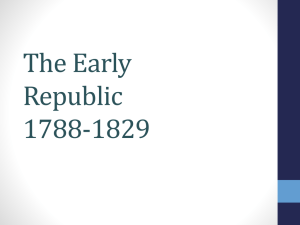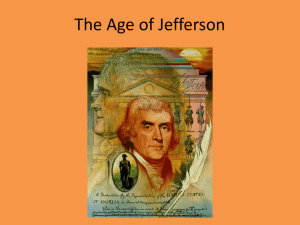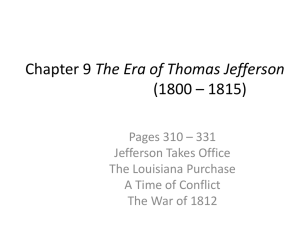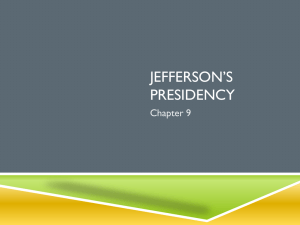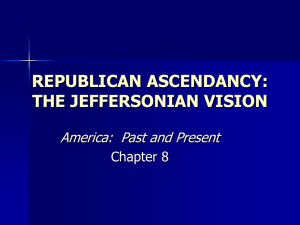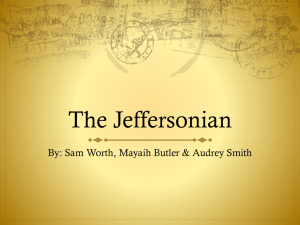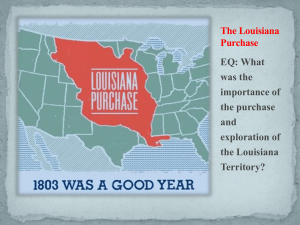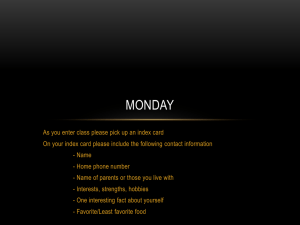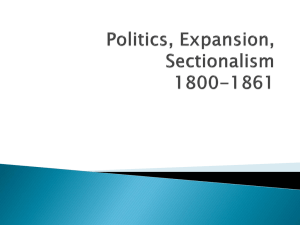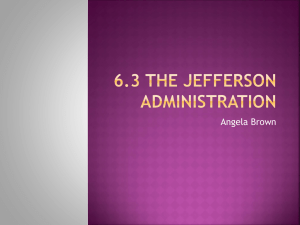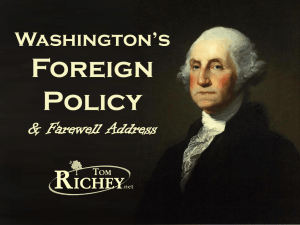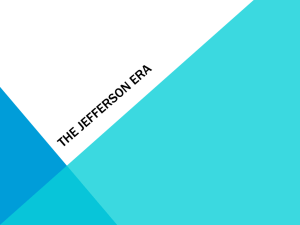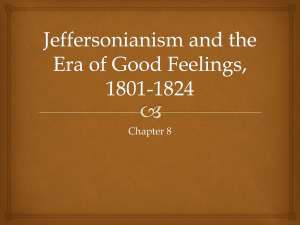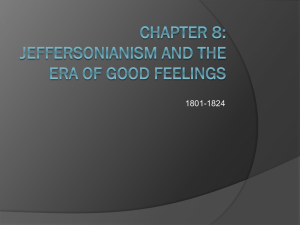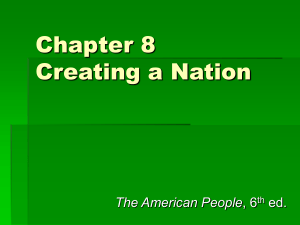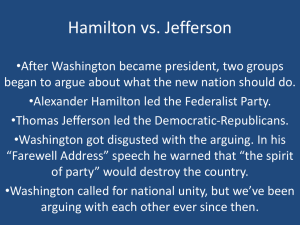Chapter 9 The Era of Thomas Jefferson
advertisement
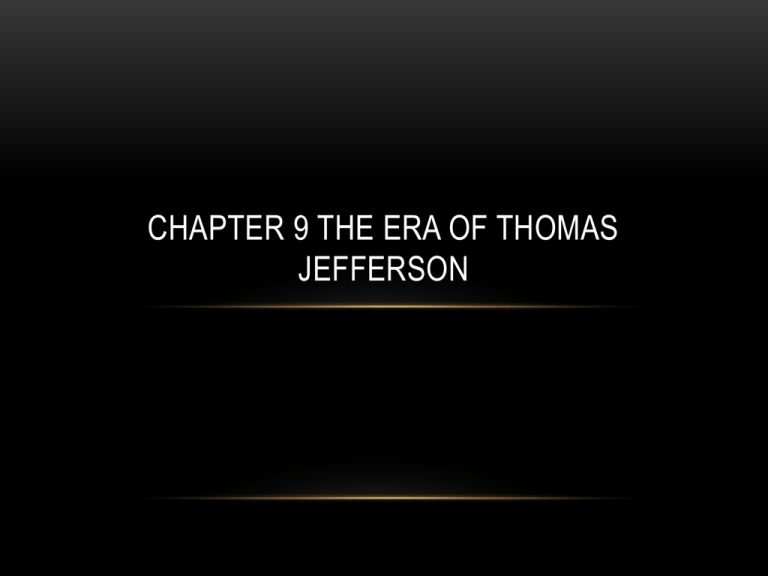
CHAPTER 9 THE ERA OF THOMAS JEFFERSON 9.1: JEFFERSON TAKES OFFICE • Election of 1800: 3 Strong Candidates • Thomas Jefferson: Republican • Aaron Burr: Republican • John Adams: Federalists • Votes are Tallied • Jefferson received 73 Electoral Votes • Burr received 73 Electoral Votes • House of Representatives voted 36x to end the tie (Jefferson won) CHANGING OUR NATION • Jefferson had many ideas about changing our government. • Wanted to limit the power of our gov’t • Believed in Laissez faire • Fired all tax collectors • Cut # of U.S. diplomats • Shrank the military • Eliminated all federal taxes • Kept most Federalists officeholders if they promised to be loyal and good citizens MARBURY VS. MADISON • Jefferson did not want to keep Judge William Marbury in office. • Adams appointed him late to keep Federalists in power • Jefferson ordered James Madison to stop all the work on the new appointments to office, causing Marbury to not become a Judge. • Marbury sued Madison and Supreme Court ruled Judiciary Act unconstitutional but Marbury did not get to keep his office • Ruling did establish Judicial Review CAN YOU REMEMBER? • 1. Explain the outcome of the election of 1800. • 2. Explain how Jefferson put his policies into action. • 3. What was the importance of the Marbury vs. Madison case? 9.2: LOUISIANA PURCHASE MOVING TO THE WEST • Many Americans were moving west toward the MS River. • MS River was the main way of transportation, but Spain controlled the river down to New Orleans. • U.S. organized the Pinckney Treaty to prevent Spain from closing down ports. • 1801, the treaty was nullified when Spain gave New Orleans and the rest of Louisiana France. • Fearing the French leader, Napoleon Bonaparte, Jefferson tried to by New Orleans. LOUISIANA PURCHASE • Jefferson sent James Monroe and Robert Livingston to make an offer for New Orleans and West Florida territory. • Napoleon at the time was fearing a war with Britain, and needed money to support his war effort. France offered New Orleans and the entire Louisiana Territory in return for $15 Million dollars (4 cents an acre) • This purchase doubled the size of the nation. JEFFERSON WORRIES ABOUT THE PURCHASE • Thomas Jefferson is originally ecstatic about the purchase of Louisiana, but he also is worried b/c Constitution doesn’t state the power to buy foreign land. • Jefferson ultimately decides this could be labeled a treaty and it is approved quickly by Congress. PLANNING AN EXPEDITION • Jefferson planned to spend $2,500 to fund an expedition to the west. • Meriwether Lewis and William Clark were chosen to lead the expedition. There were given specific goals: • Make contact with Natives • Make reports on geography, plants, animals, natural features • Find a waterway to the Pacific Ocean from the MS River LEWIS AND CLARK HEAD OUT WEST • Spring 1804: Lewis/Clark leave from St. Louis heading up the MO River. • Expedition included 3 boats carrying supplies and 40 other men • Oct. 1804, they had reached North Dakota (Mandan people) • They were joined by French Canadian trader and his wife (Sacagawea): Shoshone Indian CROSSING THE RUGGED ROCKIES • April 1805, the expedition reached the Continental Divide in the Rocky Mts. • Both men were disappointed to not find a river to the Pacific • Sacagawea helped supply the explorers with horses to cross the Rockies from her brother. • Once through the Rockies, Lewis and Clark traveled down the Columbia River to the Pacific Ocean • Lewis and Clark left in March 1806 and began their trip back to St. Louis. OTHER EXPEDITIONS TO THE WEST • Zebulon Pike explored the southern part of Louisiana. • Traveled through the Rocky Mountains • Discovered Pikes Peak (never made it to the top because the snow was too deep) • Pike was arrested in New Mexico because the Spanish believed he was an American spy. CAN YOU REMEMBER? • 1. Why was New Orleans important to the American people? • 2. How did the United States obtain the Louisiana Territory? • 3. Explain what happened during Lewis and Clark’s expedition. 9.3: A TIME OF CONFLICT STRUGGLE WITH THE BARBARY STATES • Americans were very dependent upon the sale of goods in Europe. • After the American Revolution, Pirates began attacking American ships in the Mediterranean sea. • Pirates came from 4 countries: Morocco, Algiers, Tunisia, Tripoli. (Barbary States) • Barbary states continuously attacked European and American ships • Europeans stopped the attacks by paying a tribute (ransom) • Jefferson stopped paying a tribute and sent warships to protect our American merchants. • U.S. Philadelphia was captured by pirates near the Tripoli coast and its men were held as captives • Stephen Decatur and other Americans raided the Tripoli harbor and burned the Philadelphia in order to keep the pirates from using the U.S. ship. THE 1ST MARINES • 1805, American Marines were deployed in Africa • Traveled across the Sahara Desert to capture Tripoli AMERICAN NEUTRALITY BEGINS TO CRUMBLE • 1803, Great Britain and France again engaged in a war with the Americans staying neutral • United States again teetered on both sides by trading with both nations • Both Great Britain and France began to attack American ships trading with the other country • Between 1803-1807 France captured 500 American ships, Britain captured 1000 American ships • Britain returned to the impressment tactic to influence the Americans JEFFERSON’S EMBARGO • Jefferson wanted to peacefully come to an agreement with both Great Britain and France • Passed the Embargo Act: FORBID ANY FOREIGN TRADE (1807) • Jefferson predicted this would stop the attacking of American ships • Instead, Embargo Act caused the United States to suffer • Exports fell from $109 Million--$25 Million • American prices fell and hurt farmers and planters, many of American lost their jobs • Americans were upset at the Embargo Act. • Many turned to smuggling to get around the Embargo Act. • Act was finally repealed in 1809 with the Nonintercourse Act: Americans could trade with all nations except Great Britain and France. BATTLING TECUMSEH • As more and more Americans pushed into the western lands, more and more Native Americans were being forced off their lands. • Many Natives suffered from the White diseases (measles, smallpox, influenza) • Hunting grounds were cleared for farming • Native American population dropped • Shawnee leaders Tenskwatawa and Tecumseh urged Natives to resist American advancement • William Henry Harrison (Governor of IN Territory) sent soldiers to the Tippecanoe River • Harrison’s men defeated the Natives • Led to more Native uprisings 9.4 WAR OF 1812 ADVANCING TOWARD WAR • James Madison has taken the Presidential office as of 1809. • Americans developed a sense of Nationalism • 2 leaders in the House of Representatives helped raise the support for war • Henry Clay (KY) and John C. Calhoun (SC) These men were called War Hawks • Others against war believed war with Britain would harm our trade • 1812, Britain says they will continue to impress sailors and help Natives in the West by providing weapons • By June of 1812, Congress declares war on Britain WAR OF 1812 • Britain was in a tough bind during the early days of the war. They were still in a war over in Europe (lacked enough men but they supplied Natives to help them out) • United States was not prepared for war either: Jefferson weakened the American military when it was shrunk • U.S. only had 16 warships and Army only had 7,000 soldiers • Britain’s massive navy was able to blockade most U.S. ports • USS Constitution vs. Guerriere: sea battle where the USS Constitution won and received its nickname “Old Ironsides” WAR IN THE SOUTH AND WEST • Most war supporters wanted to invade Canada but lack of confidence by the Generals forced them to retreat • Battle of Put-In-Bay: 3 hour battle in 1813. American Commander, Oliver Hazard Perry’ ship was badly damaged but jumped on another ship to shout out American Victory. • Andrew Jackson was the American commander in the South. • Defeated the Creeks Indians in 1814 at the Battle of Horseshoe Bend FINAL BATTLES • August 1814, British marched to Washington, DC. As they did this, 1st lady, Dolley Madison, gathered up important papers and fled from the White House • British set the White House on fire then moved on to Baltimore, MD • September 13, 1814: Francis Scott Key watched as the British attacked Fort McHenry. Wrote “The Star-Spangled Banner” to represent the battle • 1814, Britain was tired of fighting. Ghent, Belgium Dec. 24, 1814 the Treaty of Ghent ended the war. News took several weeks to reach all the U.S. • January of 1815, Andrew Jackson led the attack on New Orleans. PROTEST AND PEACE • Many people were against the war. Most called the war “Mr. Madison’s War” • New Englanders were most upset over the war. It damaged American trade. • Dec. 1814, a group of Federalists met in Hartford, CT. discussed seceding from the United States. Before they could secede, the war ended and so did the Hartford Convention • Many people called this the 2 nd War for Independence.
